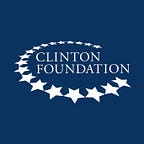In Northeast Florida, President Bill Clinton visits Foundation health programs
Tuesday marked the second day of President Clinton’s tour of Foundation projects in the United States, including efforts to fight the opioid crisis and food insecurity in the Jacksonville community
President Clinton continued his tour of Clinton Foundation program work in the United States on Tuesday with a trip to Northeast Florida. His stops included a number of projects related to the Clinton Foundation’s Health Matters Initiative, including a meeting with individuals in recovery from substance abuse disorder; discussions with community leaders about steps being taken to combat the opioid crisis; and a food repackaging program that reduces food waste and provides hot, healthy meals to people in need.
On Monday, the trip kicked off with a visit to Baltimore. President Clinton led a summit on the opioid epidemic at the Johns Hopkins Bloomberg School of Public Health. Later, he visited a library and playground where Too Small to Fail, the Foundation’s early childhood development initiative, has worked to incorporate early literacy tools and prompts into programming. Read more about President Clinton’s trip to Baltimore here.
Tuesday’s visit to Jacksonville kicked off at the Orange Park Medical Center, as President Clinton met with members of the Azalea Project, which works to eliminate infant mortality by providing support for at-risk families and mothers facing addiction, and resources for healthy living and childhood development. President Clinton met with Ronnika Thomas and Teleauba Revels-Rains, two mothers who have been helped personally by Azalea.
The project is part of the Northeast Florida Healthy Start Coalition and community partner of the Clinton Health Matters Initiative (CHMI) to help mothers and infants. Over 200 women annually are helped through Azalea specifically, and nearly 3,000 are helped across the entire Northeast Florida Healthy Start Coalition. The visit also marked a donation from Too Small to Fail of 100 tote bags for the Azalea Project with tools to help parents and caregivers read, talk, and sing to their young children.
From there, President Clinton met with members of the Northeast Florida Drug Task Force, including Susan Pitman, the executive director of Drug Free Duval. Susan showed him a tool called SBIRT — Screening Brief Intervention and Referral to Treatment. This tool is an evidence- and research-based assessment that picks up important risk flags for substance abuse.
The Task Force is a partner with the Clinton Health Matters Initiative in fighting the opioid crisis in the community.
Because these surveys are self-administered, they have a better chance of picking up specific details — and the demographic information compiled by the surveys can help policymakers, health care professionals, and first responders.
Next, President Clinton spoke to staff at the Orange Park Medical Center, including Dr. Jodie Graves, the Director of Pharmacy and co-chair of the Northeast Florida Drug Task Force. She discussed the security measures that the medical center has in place to control medications, including opioids, through biometric scanning and a database of drug usage — which helps the center monitor patterns for adverse effects and abuse.
From here, President Clinton spoke with Debbie Kelly, the mother of a young man who died of an opioid overdose. She talked about her loss and how she’s channeled her work into a foundation that raises awareness of substance abuse. He saw a demonstration of how Narcan — an opioid overdose reversal drug — is administered. Members of the Task Force discussed the importance of always combining the drug with a call to first responders, as in many cases the drug will only delay, not stop, the fatal effects of an overdose.
During the visit, the Clinton Health Matters Initiative announced a donation of 500 units of Narcan to the community by Adapt Pharma — a partner with the Clinton Foundation that has helped give schools and colleges across the country access to Narcan free of charge.
From here, President Clinton traveled to the University of North Florida where he met with the Food Fighters — a hunger-relief organization that was established at the University eight months ago. The Food Fighters are made up of student volunteers who recover excess food from the Osprey Café on campus, and repackage it into healthy meals. Over 3,500 pounds of food have been recovered, repackaged, and provided to the Northeast Florida AIDS Network and the Sulzbacher Center.
President Clinton talked about how this program should serve as a model to colleges and universities around the country:
“All over the world, the most efficient nations in food recovery are going to have much healthier societies and much more stable economies. When you see this become a global trend, never forget you were here on this day. This could change America. If Florida got branded as the leader on this issue, every state would soon be doing it. Then every college president in every state in America would have to explain why she or he is not doing it.”
The Clinton Foundation has worked with the University’s newly launched Center for Nutrition and Food Security to launch the Hunger Network, a community partnership working together to find solutions to hunger in Jacksonville. The Hunger Network was developed out of community feedback from the 2016 Food Summit, co-hosted by the Clinton Foundation, UNF, the Florida State College at Jacksonville, and the Mayo Clinic Jacksonville.
President Clinton left the university and headed to the Jacksonville Airport, bound for St. Louis. Look out for updates from President Clinton’s trip to Missouri today!
